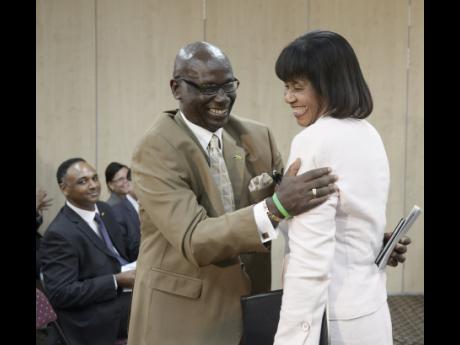‘Have we no shame’ – Simpson Miller
"You going to want cooperation. CCJ a come."
That was Opposition Senator Robert Montague's retort in the Senate last Friday after the Government refused to accept a suggestion from him for amendments to the Timeshare Vacations Bill, which was eventually passed.
A few days earlier, Prime Minister Portia Simpson Miller had appealed for bipartisan approval of three bills before Parliament, seeking to have the Caribbean Court of Justice (CCJ) established as Jamaica's final appellate court.
It requires a two-thirds majority in both Houses of Parliament to secure the passage of the three bills.
Despite having this support in the House of Representatives, the Government needs the support of at least one Opposition Senator to secure the passage of the bills in the Upper House.
Opposition Leader Andrew Holness has indicated that his side will not back down from its position that the matter of the CCJ be put before the people in a referendum. In addition, opposition senators have signed agreements giving Holness the right to dismiss them in the event they vote against the party's position and back the CCJ.
The bills were tabled July 2012, but the parliamentary opposition has insisted that they be put before the people in a referendum.
POLITICAL CONSENSUS
"I am still hopeful that, more than 50 years after our Independence, we can achieve political consensus between the Government and Opposition to fulfil this important aspect of achieving independence and adopting the CCJ as Jamaica's final Court of Appeal," said Simpson Miller as she addressed the House last Tuesday.
But the benches on the other side of the Chamber were empty, as Holness had led his side in a walkout to protest the failure of Simpson Miller to answer questions he had tabled in the House the previous week.
In a jab at the Opposition, Simpson Miller noted its insistence that there should be a referendum, an exercise which she said would work to her party's advantage.
"Let us remind ourselves that a referendum is a political process. Political parties use them for political advantage. We should not subject a decision concerning our judiciary and the highest level of our legal and judicial system to partisan politics and to the excesses of political rhetoric on political campaign platforms," argued Simpson Miller.
The Prime Minister also knocked a suggestion put forward by former Prime Minister Bruce Golding, a few years ago, that Jamaica should establish its own final court. Then, while closing the debate on the Charter of Fundamental Rights and Freedoms, Golding said, "We wish to consider our own final court of appeal."
"We would, respectfully, wish that is something for which due consideration be given," Golding told Parliament, adding: "It is something we wish to consider in great detail and in earnest. We believe we have the judicial experience; we believe we have the maturity to do it."
SUBSTANTIALLY UNDERFUNDED
But last Tuesday, Simpson Miller declared, "Everyone knows and accepts that the Jamaican court system is already substantially underfunded, and that the fiscal reality that gives rise to this underfunding is not likely to change any time soon."
She added: "It would be misguided and unwise to have a new home-grown organ as our highest court, without the consistent and predictable budgetary support available to do so."
The Prime Minister noted that the CCJ was already fully funded and that Jamaica has already repaid its share of those loans.
"Since the costs of the CCJ are covered by the income and gains generated by the fully endowed trust fund, the CCJ is not a charge on the national budgets of the countries which make use of the court," she said.
The prime minister also said that the CCJ is acknowledged as the court in all the world that is most insulated from political interference.
"The Privy Council is a British institution. Its existence depends on the impulse and decisions of the UK government. There have been calls from the president of the Supreme Court in the UK for Caribbean countries to make use of the CCJ and free up their judicial time to deal with cases from their home country," the prime minister recalled.
"Surely, it is time for us to take that not-so-subtle hint. Are we going to wait until we are asked directly to leave? Have we no shame?," the prime minister quizzed.

